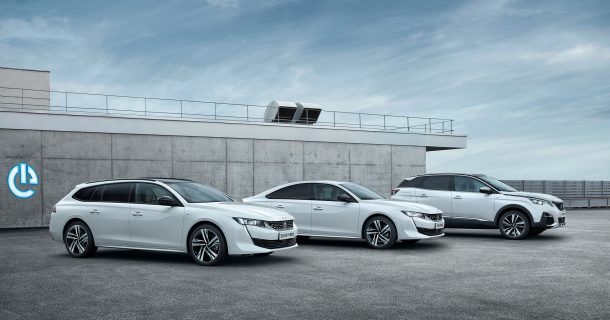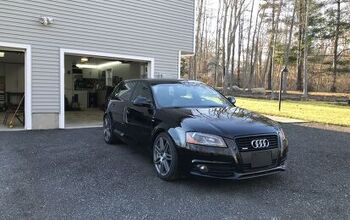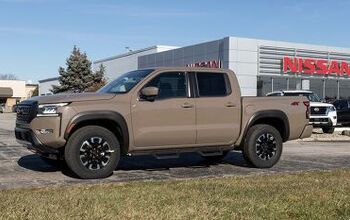Take Two: PSA Group Confirms Peugeot's Return to U.S.

Twenty-eight years after limping out of the U.S. marketplace, news comes of Peugeot’s impending return. While we’ve known for nearly three years that a newly invigorated PSA Group plans to slowly increase its presence in North America, ultimately offering French cars for retail sale, until Monday the exact brand at the forefront of the plan remained a mystery.
Wonder no more. The last French brand offered for sale in North America will be the next one offered for sale.
The news came in an update to the automaker’s Push to Pass strategic plan. With efficiencies achieved and new markets in its sights, phase two of the plan is underway. Just don’t expect Tricolor flag decals anytime soon.
The automaker’s North American re-entry is a work in progress. First up is the continued expansion of PSA’s Free2Move mobility effort, which first landed in Seattle in 2017. The vehicles earmarked for the U.S. and Canadian markets must be designed and built with those countries’ regulations in mind, and the homologation process has apparently already begun. PSA will need locations for sales and service. Based on news reports from last year, the automaker will likely opt for a traditional franchised dealer network in 15 states and four provinces.
Until PSA says otherwise, the latest arrival date is still 2026.
According to Automotive News, PSA boss Carlos Tavares said the first U.S.-bound vehicles will make the trip from factories in Europe and China. Other markets get their own PSA brand, with India gaining Citroën vehicles and Russia receiving Opel products, PSA claims.
In its first U.S. go-round, Peugeot sales hit a peak in 1984, dwindling sharply in the years following. Its last year in the market, 1991, saw just 3,555 Peugeots leave dealer lots. PSA isn’t taking chances, so slow and cautious is the name of the game.
[Images: Peugeot]

More by Steph Willems
Latest Car Reviews
Read moreLatest Product Reviews
Read moreRecent Comments
- Redapple2 Love the wheels
- Redapple2 Good luck to them. They used to make great cars. 510. 240Z, Sentra SE-R. Maxima. Frontier.
- Joe65688619 Under Ghosn they went through the same short-term bottom-line thinking that GM did in the 80s/90s, and they have not recovered say, to their heyday in the 50s and 60s in terms of market share and innovation. Poor design decisions (a CVT in their front-wheel drive "4-Door Sports Car", model overlap in a poorly performing segment (they never needed the Altima AND the Maxima...what they needed was one vehicle with different drivetrain, including hybrid, to compete with the Accord/Camry, and decontenting their vehicles: My 2012 QX56 (I know, not a Nissan, but the same holds for the Armada) had power rear windows in the cargo area that could vent, a glass hatch on the back door that could be opened separate from the whole liftgate (in such a tall vehicle, kinda essential if you have it in a garage and want to load the trunk without having to open the garage door to make room for the lift gate), a nice driver's side folding armrest, and a few other quality-of-life details absent from my 2018 QX80. In a competitive market this attention to detai is can be the differentiator that sell cars. Now they are caught in the middle of the market, competing more with Hyundai and Kia and selling discounted vehicles near the same price points, but losing money on them. They invested also invested a lot in niche platforms. The Leaf was one of the first full EVs, but never really evolved. They misjudged the market - luxury EVs are selling, small budget models not so much. Variable compression engines offering little in terms of real-world power or tech, let a lot of complexity that is leading to higher failure rates. Aside from the Z and GT-R (low volume models), not much forced induction (whether your a fan or not, look at what Honda did with the CR-V and Acura RDX - same chassis, slap a turbo on it, make it nicer inside, and now you can sell it as a semi-premium brand with higher markup). That said, I do believe they retain the technical and engineering capability to do far better. About time management realized they need to make smarter investments and understand their markets better.
- Kwik_Shift_Pro4X Off-road fluff on vehicles that should not be off road needs to die.
- Kwik_Shift_Pro4X Saw this posted on social media; “Just bought a 2023 Tundra with the 14" screen. Let my son borrow it for the afternoon, he connected his phone to listen to his iTunes.The next day my insurance company raised my rates and added my son to my policy. The email said that a private company showed that my son drove the vehicle. He already had his own vehicle that he was insuring.My insurance company demanded he give all his insurance info and some private info for proof. He declined for privacy reasons and my insurance cancelled my policy.These new vehicles with their tech are on condition that we give up our privacy to enter their world. It's not worth it people.”



































Comments
Join the conversation
I still have a soft spot for a Renault Fuego, Peugeot 405mi16 and Citroen XM. Too bad they all left the market by the time I could afford to buy a car.
I have spent time in Denmark. And not sure what models I was looking at-but Peugeot makes some very attractive CUV/SUV's.